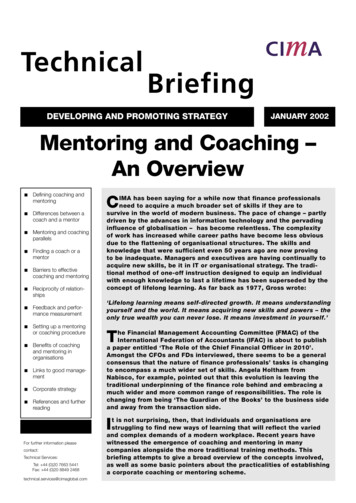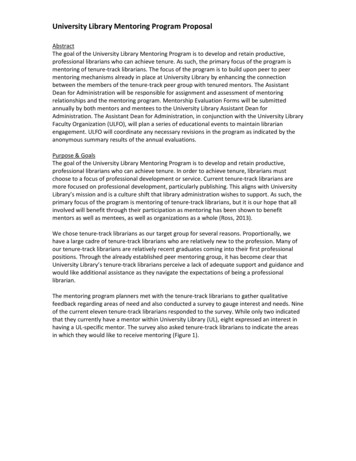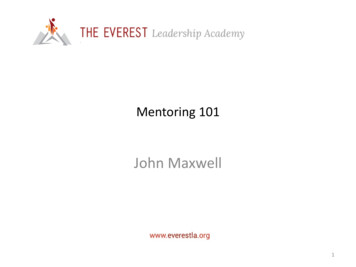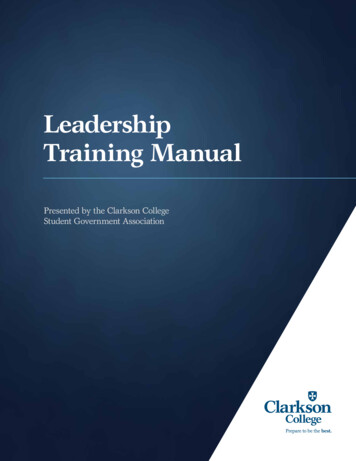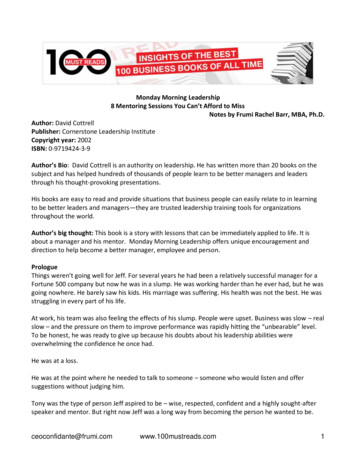
Transcription
Monday Morning Leadership8 Mentoring Sessions You Can’t Afford to MissNotes by Frumi Rachel Barr, MBA, Ph.D.Author: David CottrellPublisher: Cornerstone Leadership InstituteCopyright year: 2002ISBN: 0-9719424-3-9Author’s Bio: David Cottrell is an authority on leadership. He has written more than 20 books on thesubject and has helped hundreds of thousands of people learn to be better managers and leadersthrough his thought-provoking presentations.His books are easy to read and provide situations that business people can easily relate to in learningto be better leaders and managers—they are trusted leadership training tools for organizationsthroughout the world.Author’s big thought: This book is a story with lessons that can be immediately applied to life. It isabout a manager and his mentor. Monday Morning Leadership offers unique encouragement anddirection to help become a better manager, employee and person.PrologueThings weren’t going well for Jeff. For several years he had been a relatively successful manager for aFortune 500 company but now he was in a slump. He was working harder than he ever had, but he wasgoing nowhere. He barely saw his kids. His marriage was suffering. His health was not the best. He wasstruggling in every part of his life.At work, his team was also feeling the effects of his slump. People were upset. Business was slow – realslow – and the pressure on them to improve performance was rapidly hitting the “unbearable” level.To be honest, he was ready to give up because his doubts about his leadership abilities wereoverwhelming the confidence he once had.He was at a loss.He was at the point where he needed to talk to someone – someone who would listen and offersuggestions without judging him.Tony was the type of person Jeff aspired to be – wise, respected, confident and a highly sought-afterspeaker and mentor. But right now Jeff was a long way from becoming the person he wanted to be.ceoconfidante@frumi.comwww.100mustreads.com1
After debating whether or not to call Tony, Jeff finally decided that he had nothing to lose. His life wascareening out of control and something needed to change.After explaining some of the problems he was encountering, Tony agreed to work with Jeff only if hewould commit to two things:1. Tony said that he was not interested in helping Jeff solve his problems. Tony was interested inhelping Jeff become a better person and leader and that would require spending somesignificant time together. If Jeff would commit to meeting with Tony every Monday for eightweeks, Tony would be glad to help.2. Tony also asked Jeff to commit to teach others the lessons and experiences that he would besharing with Jeff. Tony said none of Jeff’s problems were unique and that others could learnfrom Tony’s experiences.As it turned out, those eight meetings – Jeff’s “Monday Mornings with Tony” – were the best meetingsJeff attended in his life. The thought of “gracefully bowing out of sessions” never again crossed hismind.The First Monday - Drivers and PassengersTony arrived late for the first Monday, blaming his tardiness on the rain. After several minutes ofcatching up, Tony said it was time to get down to business.Tony began by setting some ground rules for to follow in order to make the best use of their meetings.Start and finish on timeTell the truthTry something differentJeff’s IssuesBusiness was getting tougher. Most of his team was still intact, but some of the performanceissues he once ignored were now affecting his division’s performance in a big way – and by“big” he meant they were becoming threats to his job.He was working hard – long hours – but the business indicators were telling him things werepretty bad. He wasn’t very happy and the people on his team weren’t happy. Their resultsreflected their frustrations.Tony’s AdviceWhen it comes to leading people, there are few problems that are unique. Anyone withexperience has had to face the same issues, the same frustrations. Furthermore, Jeff was facingceoconfidante@frumi.comwww.100mustreads.com2
some challenges and seeking an outsider’s advice was a good move. Everyone needs peoplewho will help us look at situations from a different perspective.If Jeff wanted to be extraordinary, the first thing he had to do was stop being ordinary. Wantingto be liked and just one of the guys is natural. But as a leader, Jeff’s team should like andrespect him for the right reasons.If Jeff’s team likes him because he is fair, consistent, empathetic or a positive person – that’sgreat. But if they like him because he provides them with free dinners and drinks, what has hegained? Jeff was setting himself up for failure somewhere along the way. If Jeff’s goals were toget everyone to like him, he would avoid making tough decisions because of his fear ofupsetting his “friends.”Transitioning from employee to manager or manager to leader requires that making differentdecisions. Those transitions can sometimes create challenges in every other area of life as well.Car passengers are free to do a lot of things the driver can’t do. As a driver, Jeff’s focus neededto be on the road and not on the distractions. As a driver, Jeff no longer has the right to ‘messaround’ – like listening to loud music – even though it seems okay to do that as a passenger.The same principle applies for managers, like Jeff, to become a leader. He can no longer be apassenger; he must become the driver. Even though responsibilities increase when you becomea manager, you lose some of the rights or freedoms you may have enjoyed in the past.To be successful as a leader, managers don’t have the right to join employee ‘pity parties’ andtalk about upper management. They lose the right to blame others for a problem in theirdepartment as a manager and leader. As manager, he is the person responsible for everythingthat happens in his department, and that can be pretty hard to swallow.Managers even lose the right to some of their time because they are responsible for otherpeople’s time as well as their own.The opposite of accepting responsibility is to find someone or something to blame for theissues you’re facing. Of course, there is always someone or something to blame, but a realleader spends his time fixing the problem instead of finding someone to blame.What happens when you place blame is that you focus on the past. When you acceptresponsibility, you focus on this time forward – on the future. Until you accept totalresponsibility – no matter what – you won’t be able to put plans in place to accomplish yourgoals.You have control over how you react to situations. If you eliminate blame – don’t even have theword in your vocabulary – then you can make some positive changes.Tony handed Jeff a blue spiral notebook with the words “Monday Mornings with Tony”handwritten across the cover. He instructed Jeff to keep track of what was discussed. Whenyou write things down, you commit to doing them.The Second Monday - Keep the Main Thing the Main ThingJeff drove into Tony’s driveway at 8:20. He learned something about responsibility last week since hemade some different decisions that allowed him to be there on time.Jeff’s Issueceoconfidante@frumi.comwww.100mustreads.com3
Jeff explained that the rats won the race again last week. He had so many things coming at himfrom so many different directions, it was hard for him to get anything done and done well.Jeff has fifteen people reporting to him. His department also has two open positions. Jeff’sboss, Karen, is demanding – and that’s putting it mildly. The team seems to get less and lessaccomplished. As soon as they put out one fire another pops up.Tony’s AdviceTony advised that Jeff’s job was not crisis management. There are some basic questions that requireanswers at this point:o Why do you have two open positions?o Why did these team members leave?o Why do you think everyone on your team knows they’re supposed to be doing if they’re notdoing it?o What are your priorities?They must ‘keep the main thing the main thing’. The ‘main thing’ was the purpose or priority. Ifeveryone on the team knows the main thing, it helps everyone focus on what is important.The main thing is really three things:o Equip employees with the tools to be successfulo Provide outstanding service to customerso Make a profitWhen you depend on another’s perceptions to match your expectations, you’re setting yourselfup for disappointment. Ask some questions you may be surprised by your team members’answers.Try to understand why people choose to leave a manager’s team. It’s a natural tendency (butnot an accurate perception) to blame pay, benefits, upper management, salary administration,and other factors for someone’s resignation. People normally don’t leave because of thosereasons. People leave because their manager is not meeting their needs. People quit peoplebefore they quit companies.For managers to be successful and provide employees with the necessary tools for them to besuccessful, manager and boss must work together – no matter what.Managers need to take the time to manage their boss the same way they manage theirsubordinates. Both manager and boss should find out specifically what they each need fromeach other. They need to understand what they can do to help each other accomplish theirmain 4
The Third Monday - Escape from Management LandJeff’s Update and IssuesJeff spent a lot of time on the three questions he left with last week. Much of his frustrationhad been not knowing what the problem was – much less what to do to fix it. Jeff thought hehad made some real progress this week.First, he handled the resignation issue head-on. He talked to a few people on his team. Andwhile they were reluctant to speak for their former teammates at first, one person providedsome interesting information.Jeff met with each of them individually, and since they no longer work for him, there was noreason for them not to tell the truth. Both seemed surprised he was interested enough to gosee them and they opened up – more than he expected.He was shocked by what he heard. They didn’t come right out and say it, but it became clearthat they didn’t leave the company; they left Jeff, their manager. It came down to three things:1. Hire good employees - The problem was his good employees were being asked to domore and more, while others were asked to do less and less.2. Coach every member of the team to become better -Jeff hadn’t provided adequatefeedback and direction to either of these employees.3. De-hire the people who aren’t carrying their share of the load. There were performanceissues he had ignored and those issues had an effect on the rest of the team.At least Jeff knew there were things he could do to avoid losing more good employees. He hada meeting with his team. He prepared a paper for each team member to complete. On thepaper was one sentence: ‘The main thing in our department is.’ Each person was asked to fill inthe blank.No one knew what the main thing was. Everyone had an answer, but there was no consistency.This exercise showed Jeff that instead of clearly defined goals and expectations, he had massconfusion about their most important mission as a team.Jeff also had a good meeting with his boss, Karen. She appreciated him taking the initiative tomeet with her.Jeff showed up in a better mood because he realized that there are things that he controls thathave contributed to his frustrations and the team’s frustrations. Now he knew that there issomething that can be done within his control.Tony’s adviceOne of the ‘main things’ for a leader to eliminate is confusion. It can paralyze a team.Something that may have contributed to the confusion on Jeff’s team was a trap manymanagers fall into. This is the trap iwhich Tony calls ‘management land’, where things are notalways as they seem.In management land, simple things often become complex and people easily lose perspective.In management land, people are rewarded for saying only the things managers want to hear.Egos are big and it’s difficult to discover the truth. Management land can be described asceoconfidante@frumi.comwww.100mustreads.com5
confusing, frustrating and sometimes comical to those on the outside. “You have to escapefrom management land and get in touch with your people.”On most teams there are three types of employees. Some are superstars – people who havethe experience, knowledge and desire to be the very best at their jobs. Others are middle stars– they may not have the experience to be a superstar yet. Or maybe they are former superstarswho for some reason lost their motivations to be the best. And there are those Tony calls fallingstars. Those are the ones who are doing as little as they can get away with.A typical team has about 30% superstars, 50% middle stars and 20% falling stars. If you keeppiling more work on your superstars – then one shouldn’t expect them to continue to besuperstars.Many managers actually reward their falling stars by giving them less work while acknowledgingthem with decent performance reviews!Your job is to lower the bottom by adjusting for and accommodating the lowest performingemployees. You should be raising the top by recognizing and rewarding superstar behaviors!Tony asked Jeff to write the name of each team member in his spiral notebook and thencategorize them as superstars, middle stars or fallings stars. He asked him to retrieve everyperson’s most recent performance review. Then, put their most recent performance reviewscore next to their name. Next, pull their personnel file. and note each improvement over thepast six months.The Fourth Monday - The “Do Right” RuleJeff’s Update and IssueJeff felt like he took some quantum leaps backward since last week. He found that he had beenreally inconsistent in how he evaluated his employees. Some of his falling stars actually hadbetter performance reviews than his superstars. He also checked the personnel files. Therewere no letters of recognition and only one performance improvement documented over thepast six months and it was on a superstar.The bottom line was that Jeff lumped everyone into the middle as far as recognition andperformance improvement.He continued with his team discussion on identifying the main thing, and they did make someprogress in that area. Human resources was working on finding some candidates to interview asthey try to fill those two open positions on his team.Jeff had a major issue on his team, and it involved one of his superstars, Todd. This employeehad been with the company for four years. He was really good at his job and had a goodrelationship with all the members of his team. He was dependable, consistent andknowledgeable. But, three weeks ago Jeff discovered that this employee had been drinking onthe job.Using alcohol during work hours was against company policy and the team’s code of behavior.Jeff wrote him a warning letter stating that the next violation would lead to termination. Then,last Friday, Jeff saw Todd drinking again. To Jeff’s knowledge no one on his team knew abouthis m6
Tony’s AdviceA manager’s job is to raise the top for long-term, sustained success, not for short-termconvenience. Short-term results are easy. He can threaten people, pay them more, or just givethem what they want, and get short-term results.Achieving long-term results is much more difficult. It requires establishing a code of behaviorthat must be followed. It requires providing accurate feedback. It requires delivering theconsequences – both positive and negative – based on decisions that employees make. All ofthese require courage to do the right thing.People can be superstars in one area and falling stars in another area. Do what is right evenwhen no one is watching!Sometimes it’s difficult to know what is ‘right’ when you’re in the middle of a crisis. The bestdecisions are normally made before you’re in a crisis. You can think more clearly and evaluatealternatives better.A pilot once told me that every conceivable problem that could happen while he was flying aplane had been simulated, documented, and placed in a contingency manual in the cockpit.That manual documents everything that can go wrong and what actions to take if there is aproblem.Pilots don’t make decisions when they are in a crisis – they implement plans that were madebefore the crisis.In business, from time to time we see lights flashing, indicating we have a problem. When thathappens, some managers will throw a rug over the light so they can’t see it flashing, they ignoreit.The only way to fix the problem is to go directly to what’s causing the light to flash and fix theproblem. Like the pilot, an action plan should have been decided upon long before the crisisdeveloped.Living the ‘do right rule’ is tough because it requires discipline, commitment and courage.Many times the manager is the last to know about a problem on the team. What the managersees is normally a very small part of the whole.EVERYTHING counts when it comes to leadership. If a leader thinks ignoring the problemdoesn’t matter, they are wrong – a leader is always leading, even when they are ignoring aproblem. A team doesn’t really care if the company has an ethics department or complianceofficer. What matters to the team is what the leader does. Everything a leader does mattersbecause their team is watching and depending on them to do the right thing.Ignoring issues puts a leader or manager’s integrity at risk. And if you lose your integrity, youwon’t be able to develop or maintain trust, the very basis for relationships. A manager mustguard their integrity as if it’s their most precious leadership possession because that is what itis.ceoconfidante@frumi.comwww.100mustreads.com7
The Fifth Monday - Hire ToughJeff’s Update and IssueLast week, Jeff left his meeting with Tony and went straight to Kim in human resources todiscuss the Todd issue. Jeff and Kim decided there was no choice – Jeff had to terminate Toddfor drinking on the job.Jeff and Kim began to ‘role-play’ the discussion Jeff was about to have with Todd. The role-playhelped Jeff feel more prepared and confident. Jeff also asked Kim to witness the terminationsession.Kim’s advice to Jeff before the session was that they needed to do everything they could do tomaintain Todd’s self-respect and dignity, while being firm and fair with him.When Todd walked in the room, he obviously knew something was up. He was stunned that Jeffwould terminate him for something ‘as minor as this.’ He also accused Jeff of not having anycompassion because he was going through some personal problems. Todd then went on to saythat the team wouldn’t survive without him because he was more of a leader of the team thanJeff was.Jeff and Kim had anticipated this reaction and explained the majority of people who are firedfeel the same way: It’s someone else’s fault, ‘management has no heart,’ and there areextenuating circumstances. Todd had chosen to fire himself; they were only implementing hisdecision.After the session, it was time for his weekly team meeting. It turned out Jeff was not the onlyperson aware of the problem. His team was watching and his integrity was being challenged.The rest of the meeting went well. They finalized what the main things were for them toaccomplish. Here are the three main things they came up with:o Treat each person on the team with dignity and respecto Deliver outstanding service to their customerso Provide profits to the companyJeff learned that he should have gone to Kim earlier about the Todd issue and withouthesitation. She identified 20 candidates for Jeff to interview for his three open positions.Tony’s advicePeople are the most important resource in any company. People make the company.Customers judge a company on the people they deal with.The most important asset in your company is having the RIGHT PEOPLE on your team. If youhave the right people on your team you have a great chance to be successful.The greatest liability in your company could be having the WRONG PEOPLE on your team. Thereis nothing any competitor can do to hurt your team as much as having the wrong person on theteam.The most important thing you do as a leader is to hire the right people. You cannot have astrong and effective team with weak and ineffective 8
Your job is to hire tough-make it a privilege for someone to earn his or her way on your team. Ifyou hire tough, it will be a whole lot easier to manage the RIGHT PEOPLE.The decision a manager has to make is to hire tough and manage easy, or hire easy and managetough.When you begin the process of interviewing and hiring, understand up front that you areprobably not a great interviewer. You don’t use your interviewing skills very often.The first mistake some people make in interviewing is lack of preparation. You shouldn’t beginpreparing for the interview when the candidate is in the lobby. Every question should beprepared in advance so you spend your time listening and evaluating instead of trying to figureout what questions you want to ask next.Another problem with interviewing is you’re always emotionally involved. You will be better offby taking your time and getting the right person. I suggest you ask Kim or someone in HR tohelp – they’re not faced with the same emotions you have about these openings.The Three Rules of Three in hiring are: interview the least three qualified candidates for everyposition; interview the candidates three times; and have three people evaluate the candidates.After the initial interviews, narrow the field down to your best nine candidates. Scheduleinterviews with those nine candidates at times that are different than their original interviewtime. In other words, if your initial interview was in the morning with one person, interviewthem the next time in the afternoon or evening. You’ll be working with them all day, so why notsee what they are like at different times of the day?You may want to allow one of your superstars to be involved as well.If there is any question whether a person is qualified or not, pass on them and keep searchingfor the right person. Never lower your standards just to fill a position. You’ll pay for it later.The Sixth Monday - Do Less or Work FasterJeff’s Update & IssueJeff had made some real progress. He and Kim interviewed all 20 candidates for the openpositions. They narrowed the 20 down to nine possible candidates. Jeff is taking the hiringprocess much more seriously. It has been a time consuming process.Jeff explained to Tony that even though he had made a lot of progress during their sessions, itseems my time continues to be consumed by things outside my control. He admitted it isfrustrating because he would like to spend more time with his team and his family.Tony’s AdviceA manager may be blaming his personal time management problem on things outside hiscontrol.A manager’s time is his responsibility. If he isn’t able to do the important things, only he cansolve that problem. A team depends on their manager to be there for them, and that includessolving personal om9
One of the major sources of stress, anxiety, and unhappiness comes from feeling like out ofcontrol. A manager needs to figure out ways to take control of his time so that he can takecontrol of his life.No one has two three hours a day they could save by doing one thing better. However, manypeople find an hour or two a day they could use better by doing a few things differently.If you want to make better use of your time, you need to be looking for the small increments oftime a minute here, five minutes there, etc. Add them all up and you’ll create more time touse.People often overwork themselves by making bad time management decisions. The bottom lineis that most people can’t solve their time problem by working harder. Doing the wrong thingharder doesn’t help. What we need to do is find ways to shorten tasks, eliminate some steps,combine some tasks, and work easier while getting things done.No one can save time we all have the same amount, and we can’t carry any time over to thenext day. So since we can’t save time, we have to make better decisions on how we spend outtime.There are two ways to spend time better. You can do less or you can do things faster. Those areour only choices. Of course there are some things we could eliminate and just say no to.The first thing you need to figure out is where your time is currently going. If you want to makeimprovements, you’ve got to know what to improve. To find the answer, track your time fortwo weeks so you can make some educated decisions about what to improve.We spend our time doing the main things or doing the wrong things and we spend our timedoing things right or doing things wrong.Jeff identified the main things in his department. Now he needed to classify his activities – areyou doing those main things and how well are you doing them?Most executives have three areas where they can make changes that will lead to major timeimprovements: prioritizing,organizing, interruptions, and meetings.1. Prioritizing and organizing:o The Pareto Principle states that 80% of your results will come from 20% of youractivities. The Pareto Principle definitely applies to time management. It’s yourresponsibility to yourself and your team to know where your highest payoff activitiesare and eliminate as many as you can of the ones that yield few results.o Every time management guru will tell you to touch paper only once.o Set aside some uninterrupted planning time every day.o Conduct an audit on every report that hits your in-box.o Is the report really necessary? If not, eliminate it. If you only need a line item off areport, ask the originator of the report to eliminate the report and send you the lineitem.o Clean your desk. A cluttered desk makes you look disorganized and contributes to theshuffling and reshuffling game.o Control your email deliveries. Work your email deliveries into your personal schedule sothat emails don’t control your day.ceoconfidante@frumi.comwww.100mustreads.com10
o Batch activities – do like activities together – so that you are not starting and stoppingall the time. Do your voice mails at once. Return all phone calls at one time. Writememos or letters at one sitting. Eliminate as many transitions from one activity toanother as possible.o Go to lunch at 11 a.m. or 1 p.m. to avoid the rush.2. Another key area of time management is interruptions.o Keep track of who is interrupting you and why they are interrupting you. Even if you can’teliminate the interruption – you can keep it short.o Arrange your furniture so that your desk does not face the flow of traffic.o Schedule one-on-one sessions with your staff and boss so that you can get as much aspossible accomplished at one time. Gather everything you need to talk about and take careof it at one sitting rather than interrupting each other the minute something comes up.o Ask your team, ‘What do I do that wastes your time and hinders your performance?’3. The biggest time waster is meetings. If everyone is prepared on-time and focused – mostmeetings can be accomplished in half the time the meeting is currently taking. Make yourmeetings productive, but short.o Don’t fall in the ‘perpetually scheduled meeting’ syndrome. Make sure every meeting isabsolutely necessary.o Always begin a meeting by covering the most important items first.o When people show up late, don’t recap what you’ve covered.o Start and end your meetings on time.The Seventh Monday - Buckets and DippersJeff’s Update and IssueLast week was a much better week for Jeff. He and Kim completed the interviewing and madejob offers to the best three candidates. Two of them accepted and start in a couple of weeks.Since Tony had told him to ‘hire tough and never lower your standards’, Jeff asked Kim to beginthe process of finding the right person for their last open position. Jeff is really excited aboutthe two new team members.Jeff also tried several of the time management tips. He kept a log of where he was spending histime and discovered he was spending a lot of time on things that weren’t important. He alsofound that one particular person in his office interrupted him at least six time a day. He showedher his log of how many times they were talking to each other in a day, and she couldn’t believeshe called him that often.He also cut the weekly team meeting time in half. They started with their most important itemsand finished them all. They accomplished in 30 minutes what normally took 90. They at leastdoubled their productivity in those 30 minutes. Jeff felt like he was in more control of his time.ceoconfidante@frumi.comwww.100mustreads.com11
Tony’s adviceTony suggested that Jeff approach two of his departed stars about the open position. Healready knew that they were superstars and would fit in with the team. Jeff might have toswallow his pride when he asked them to come back, but it was a good idea.Jeff was making progress in the three things discussed in his conversations with his formeremployees.Next Tony focused on how Jeff could coach every member of the team to become better. Thisinvolved recognition of, and communication to, everyone on the team.Here are two facts you should never forget, regardless of your title or position:o Your scorecard as a leader is the result of your team. You are needed; you areimportant. But you get paid for what your subordinates do, not necessarily what you do.o You need your team more than your team needs you. You need each other, butcumulatively, the people on a team accomplish much more than any individual.A manager or leader’s job is to help each team member become better at the job they havechosen. They have entrusted a portion of their life to you, and
Tony was interested in helping Jeff become a better person and leader and that would require spending some significant time together. If Jeff would commit to meeting with Tony every Monday for eight weeks, Tony would be glad to help. 2. Tony also asked Jeff to commit to teach others the le


